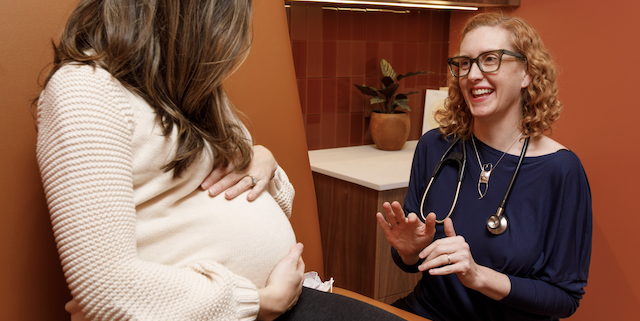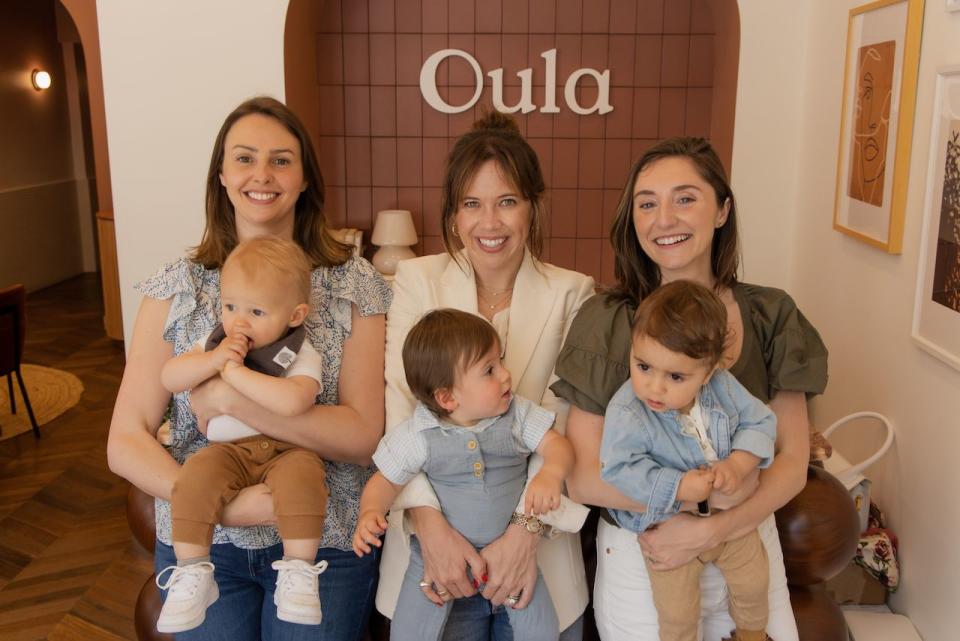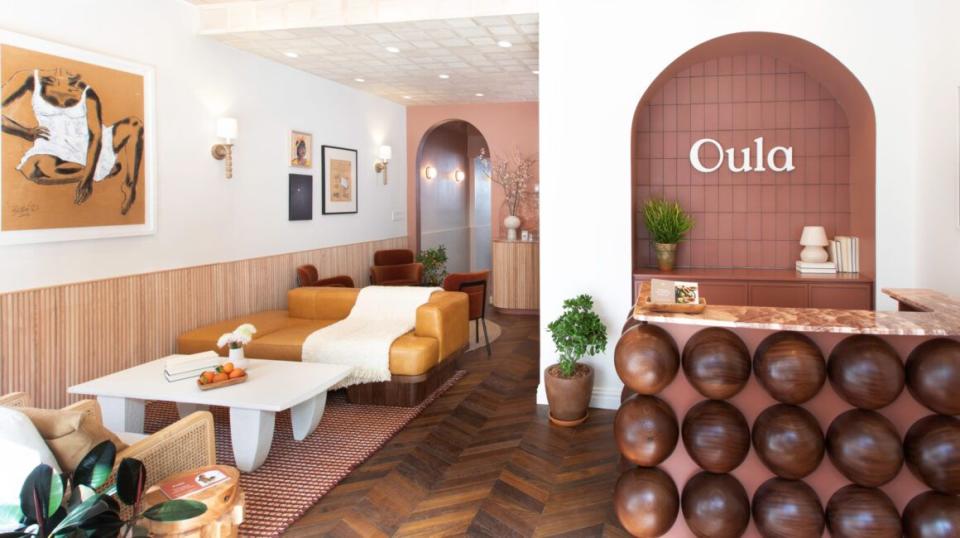Dread Going to the Ob-Gyn? These Female Founders Want to Change That


When her pregnancy test turned up positive in 2019, the first emotion Elise Thompson felt was overwhelming joy. But the 34-year-old says that happiness quickly turned to panic. “The pregnancy was planned—my husband and I wanted a baby,” she says. “But I had a traumatic experience with an ob-gyn in my 20s and had avoided them ever since. The thought of regular examinations and appointments terrified me.”
Knowing she was going to have to be visiting an obstetrician frequently throughout her pregnancy, Elise attempted to find a provider who would understand her past trauma and collaborate with her to get through her fears. “I searched online, hoping to find a practice that focused on sensitive, collaborative care and found nothing,” she says. “In the end, I found a provider that always felt a little rushed and didn’t care much about my emotional health. I survived the experience, but I wish it had been better.”
Elise isn’t alone—a number of women report not being satisfied with their pregnancy care. In fact, when compared with other high-income countries, women in the United States report the least positive experiences in healthcare and are more likely to deal with emotional distress. A study from 2019 found that one in six women says they felt mistreated by medical professionals. Types of mistreatment include being ignored, refused, or scolded.
But even if women don’t feel mistreated, many wish there was a bit more holistic care connected to this vulnerable time. “Doctors are busy—I get it,” says Debbie Finnerty, 42. “But when I was pregnant, I wish there had been more resources at my ob-gyn's office. I could have benefited from nutrition advice during my pregnancy and pelvic floor advice afterward.”
This holistic approach to pregnancy care that women like Elise and Debbie longed for is exactly what Oula aims to provide. Billing itself as a “modern maternity center,” Oula was founded in 2019 by chief executive officer Adrianne Nickerson, chief operating officer Elaine Purcell, chief experience officer Joanne Schneider, and medical director Ila Dayananda, MD. At the time, Nickerson, Purcell, and Schneider were all pregnant and noticed that expecting moms often had a subpar patient experience—and they were determined to change that.
Oula’s first location is located in Brooklyn, New York, and a second location is opening in downtown New York City soon. The founders say that these New York–based locations are just the beginning, and they have plans to open in other states soon. So what makes care at Oula so different?
“We were going through our own pregnancies and the care options we wanted just weren’t there,” says Nickerson. “It felt like you had to be on one end of the spectrum or the other—either you were with an OB in a hospital or you were with a midwife at home. We felt like there needed to be an opportunity that sat somewhere in the middle and provided the best of both worlds—if that’s what you wanted.”
With this in mind, Oula offers a collaborative care model, bringing doctors and midwives together under one roof. According to the World Health Organization, expanding access to midwife-led maternity care is one of the most effective ways to reduce maternal mortality, lower C-section and preterm birth rates, and bring down healthcare costs. A 2014 study found that including midwives in healthcare systems could prevent more than 80% of maternal and infant deaths.
But that’s not the only difference that Oula hopes to make. “Our model is really focusing on the experience and thinking about how we promote communication and trust so that communication mishaps don't happen at the really pivotal time of bringing life into this world,” explains Purcell.
Schnieder says that even simple things practiced at Oula make a huge difference to patients. “We have asked our patients what they like about their care and they’ve said things like, ‘Oh, your providers actually ask for consent before touching me,’” she says. “I am so glad they’re having a good experience—but, wow, does that show you how low the bar is set.”
With the goal of raising that bar, Oula sets out to support whatever type of birthing experience a patient would like to have—whether that is medicated or unmedicated or with a doctor or a midwife. It is important to note that Oula does not offer home birth services. Instead, they are affiliated with a New York City hospital.
Beyond the actual act of giving birth, the founders believe that providing information and support are extremely important. “We provide a lot of education throughout the pregnancy journey about the decisions that you have to make. There is so much misinformation on the internet, so we want to point people to reputable sources,” says Schnieder. “We see our role as helping to guide you. We create videos. We email you. We're telling you things in your appointment. And we have a patient portal where, each step of the way, we’re laying out the important things you need to know and the decisions you’ll need to make.”
And the care doesn’t end once you have a baby. As many first-time moms will tell you, those first few weeks can be a huge adjustment. The fact that you’re just handed a baby and sent home is pretty overwhelming if you think about it. “I still think it's wild that most practices, hand you a baby and are like, ‘See you in six weeks!’” says Schnieder. “For me, those first six weeks were difficult. So, at Oula, we focus on at least picking up the phone and making sure we’ve connected with patients in the first week. We want to see how you are doing and connect you with resources if you need them. We also have postpartum support groups.”

Another big difference? The Oula offices don’t look like your run-of-the-mill medical offices. Their spaces are designed to make you feel more relaxed—think plush leather couches, gorgeous art and warm paint colors. It feels more like a posh home (with medical equipment!) than a sterile office.
But just because the space oozes luxury, doesn’t mean it’s exclusive. Just the opposite. Knicerkson, Purcell and Schnieder all emphasize the importance of inclusivity when it comes to good maternal care. “We make sure our providers represent the diversity that is New York, therefore also having the impact on what our patient population looks like,” says Purcell. “ We take insurance and Medicaid. We've heard time and time again, especially from patients that identify as individuals of color, that they feel disenfranchised by the current healthcare system and they couldn't find a provider that looked like them or made them feel like they couldn’t speak openly and honestly. We felt a moral obligation to try and change that—to really blow up maternity care and rethink the entire experience. Because one thing we know for sure is that all people deserve this level of care.”
You Might Also Like

